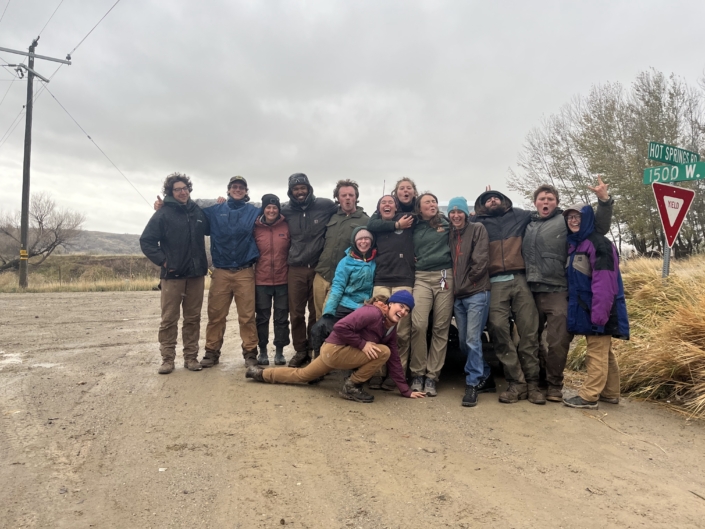

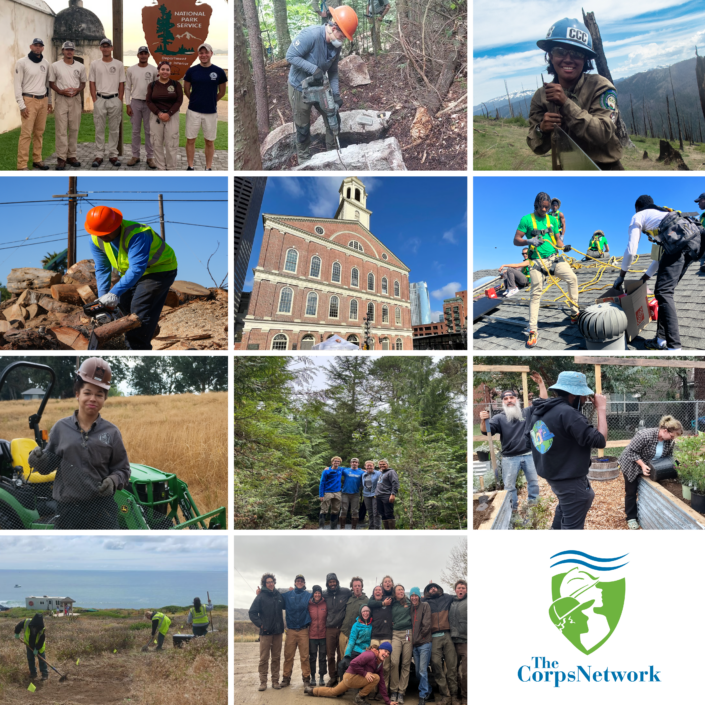
Learn about the nominees for the 2024 Project of the Year Award! We are inspired by all our remarkable finalists and their outstanding service to local communities and the young people they engage.
The Project of the Year Award recognizes achievements, innovation, and impact in the Corps world. Learn more about Awards here. The winners will be recognized at The Corps Network’s 2024 National Conference, March 19 – 21. Stories are arranged in alphabetical order by Corps name.
American Conservation Experience
San Juan National Historic Site Restoration
Purerto Rico
AmeriCorps – Education Award Program
The San Juan National Historic Site, located in the Old San Juan section of Puerto Rico’s capital city, is a sprawling fort complex with a history dating back to the Spanish colonization of the island in the 16th century. American Conservation Experience (ACE) is proud to partner with the National Park Service (NPS) to preserve and restore this significant site. Over the past year, AmeriCorps members with ACE have primarily focused on restoring the massive fortress wall, originally built in 1783. Sections of the wall can be up to 100 feet tall and 50 feet wide at the base. To maintain the wall’s historic integrity, Corpsmembers are using the same tools and materials the original builders would have used. It is a slow process, but the wall’s appearance has greatly improved, leading to a renewed sense of community pride. In addition to masonry work, Corpsmembers are doing landscaping, invasive species removal, and trail work around the site.
Through this project, ACE has had the opportunity to hire many local residents and provide a range of professional advancement and training opportunities. Over the past five years of this collaboration between the Corps and the park, 12 ACE alums have leveraged their experience and training to pursue employment with NPS, and two were hired by the U.S. Forest Service. This community engagement is key to the project’s success. As one ACE member said, “I am very proud of the work we do here and making our neighborhood look nice and clean again…Fixing up the wall and giving the children of the neighborhood, including my daughter, something more beautiful to look at makes me happy.”
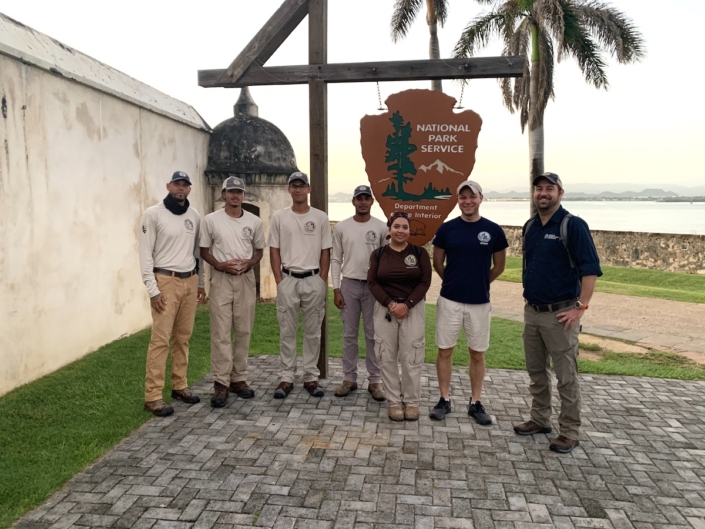
Appalachian Mountain Club
Franconia Loop Trail Restoration
New Hampshire
AmeriCorps – Education Award Program, Federal Cooperative Agreement (National Park Service, U.S. Fish and Wildlife Service)
New Hampshire’s White Mountain National Forest is one of the most visited national forests in the country and is home to some of America’s oldest and most heavily used trails. The north-south spine of the Franconia Ridge is a particularly popular destination that can be reached by a network of trails that begin at a busy trailhead in Franconia Notch State Park. This trail system helps drive New Hampshire’s multi-billion-dollar outdoor recreation economy; it needs care and investment to handle the high traffic. This is where Appalachian Mountain Club (AMC) comes in.
AMC is responsible for maintaining the 8.9-mile Franconia Ridge Loop Trails, which span federal and state lands. From 2022 – 2026, AMC Conservation Corps members are collaborating with land managers and other regional Corps – including Vermont Youth Conservation Corps, SCA, and NorthWoods – on a major trail improvement project. These trails were built between the 1820s and 1950s – before modern trail design practices. Some portions go through fragile alpine habitats, while other sections have multiple river crossings that are prone to flooding. In 2023 alone, crews installed more than 160 stone steps, 13 water bars, and multiple rock cairns above the tree line. This initiative is one of the single largest agreements AMC has managed on the White Mountain National Forest; it has attracted media attention and was even featured on NPR Weekend Edition. The collaboration and shared learning experiences on this effort have helped elevate the collective skillset of Corpsmembers from several Corps.
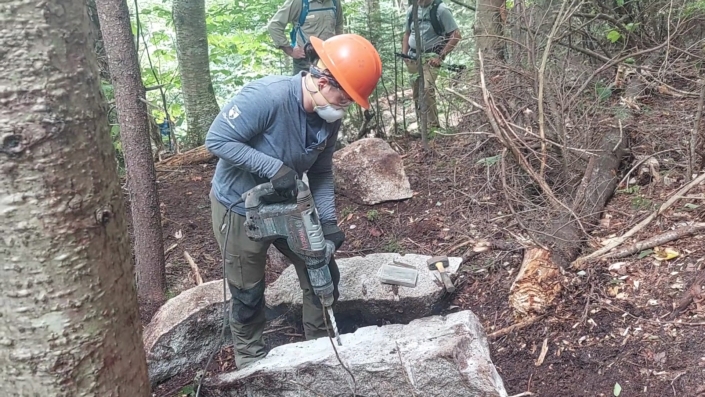
California Conservation Corps
Backcountry Trails Program
California
Federal Cooperative Agreement (National Park Service, U.S. Fish and Wildlife Service)
2024 marks the 45th anniversary of California Conservation Corps’ (CCC) Backcountry Trails Program. The long running program recruits from all over the country to place six crews consisting of 12-15 Corpsmembers, a backcountry cook and one to six agency sponsors in remote wilderness camps for five and a half month periods. Corpsmembers spend their days performing trail work, which includes everything from clearing logs and rebuilding trails to building and repairing bridges and rerouting trails around fragile areas. Crews become tight-knit communities over the course of their five months together with little to no contact with the outside world. This not only allows Corpsmembers to bond over music, art, games, and conversation but also allows for Corpsmembers to form bonds with agency sponsors who mentor them for future employment opportunities. Crews generally spend their entire term in one or two locations. This past season included locations like Yosemite National Park, Yolla Bolly Wilderness, Trinity Alps Wilderness, and several others.
The Backcountry Trail Program has made a significant impact on not only the Corpsmembers that have served but on the community and parks it has helped over its long history. In 2023, 22 of the 45 serving backcountry cooks and agency sponsors were alumni of the program. This is attributed to the close bond that Corpsmembers are able to form with mentors, setting them up for employment success with agencies like the National Park Service, U.S. Forest Service and CA State Parks. Over this past season, crews made a great impact on public lands. Among their many accomplishments, crews completed; 21,802 ft. of new trail construction, 186.55 miles of maintenance, and recruited 200 hours of volunteer work from surrounding communities. The CCC hopes this program will continue to serve as an opportunity for members to be at the forefront of change.
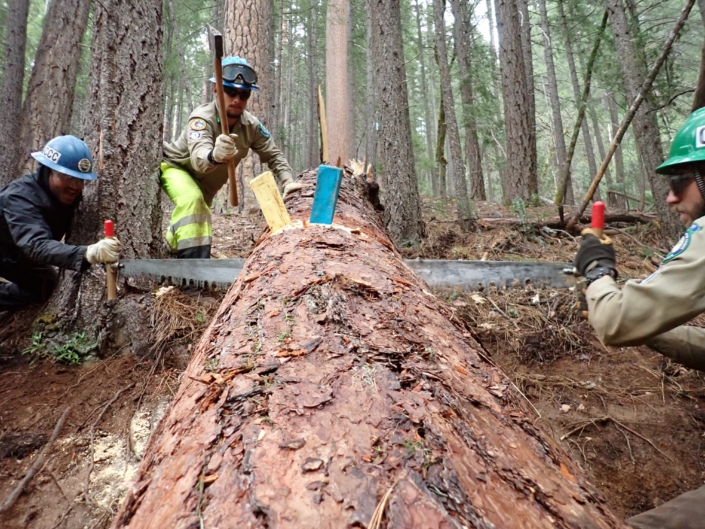
Conservation Corps of Long Beach
Urban Wood: A Passageway to a Meaningful Career
California
AmeriCorps – Education Award Program
Utilizing a $1 million grant from CALFIRE, Conservation Corps of Long Beach (CCLB) established the “Urban Wood, A Passageway to a Meaningful Career” initiative in their local community. This urban forestry project, in partnership with the City of Long Beach, Public Works, and West Coast Arborists, removed and replaced 1,000 dead or diseased trees with 2,000 healthy ones. 100% of the trees were located within a CES 3.0 DAC at 81% percentile or higher, which also included the designation of being in “High Pollution, Low Population” census tracts due to the proximity of the Port of Long Beach.
This program introduced an urban lumber salvage apprenticeship program, providing meaningful and industry-recognized job training for 73 underserved young adults. So far, 16 young adults in the most underserved communities of Long Beach completed the program for employment within the urban forestry and arboriculture industry. The initiative also resulted in a substantial environmental impact, reducing carbon emissions by 10,187 MTCO2e and saving 20 million gallons of water. CCLB established an Urban Lumber Yard and Mill, becoming a hub for urban forestry activities and CCLB’s partnerships. The project strengthened CCLB and its community’s climate resiliency by enhancing Corps partner relationships, attracting new funding, and laying the foundation for more urban forestry initiatives.
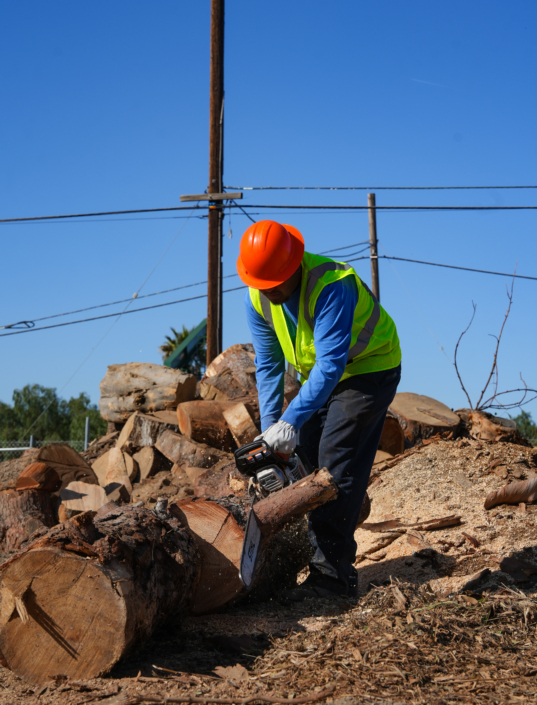
Conservation Legacy
Climate Conservation Corps Pilot Year
Massachusetts
The team that manages the National Parks of Boston (NPB) is responsible for maintaining and preserving invaluable natural, cultural, and historical resources. It is important for NPB to consider how these resources are and will be impacted by climate change. With this in mind, NPB partnered with Conservation Legacy to launch an exciting Climate Conservation Corps program in the summer of 2023 to engage young adults and community partners in tackling climate change issues that will affect the parks.
The five team members, including four AmeriCorps members, are spending their first six months of service conducting field projects that touch on each of the four pillars of the National Park Service Climate Change Response strategy: science, mitigation, adaptation, and communication. Among other projects, the Climate Corps members are learning about building science principles and will conduct energy audits at the Charleston Navy Yard and Bunker Hill Monument to report current energy use and identify areas for improved efficiency. The team is also working to restore salt marshes around the Boston Harbor Islands. This work involves collecting data, conducting biodiversity surveys, and eventually creating accessible content to engage the surrounding community in climate action.
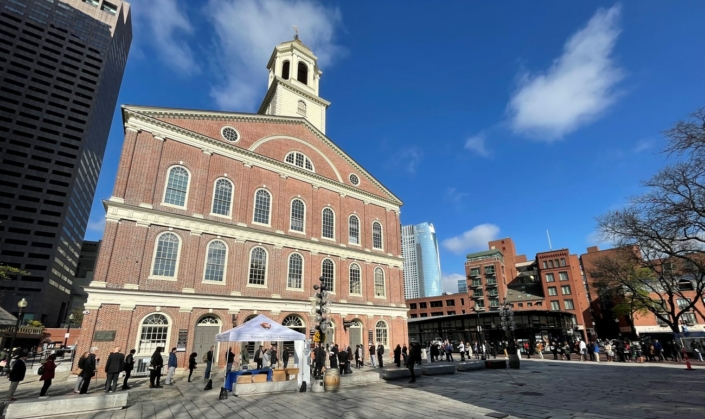
Louisiana Green Corps
New Orleans Solar Corps
Louisiana
Louisiana Green Corps’ (LAGC), Solar Corps, trains young people in the New Orleans area to install solar panels on the roofs of local churches and restaurants so that the locations can serve as community support centers in the aftermath of hurricanes. Working with partners, Together New Orleans and Get Lit Stay Lit, the goal is to establish resilience hubs at trusted sites to improve community resilience before another system-wide power outage. LAGC members participate in Solar Training opportunities gaining valuable job skills in the green-sector, while helping their communities.
LAGC believes that the Solar Corps partnership serves as an example of how workforce training programs, community organizations, and faith-based organizations can all work together to develop disaster-response capabilities. So far, 38 Corpsmembers have gotten training related to careers in Solar. Of those 38, 86% were employed 6 months after graduation. The Solar Corps has equipped four local churches and restaurants to be resilience hubs. This work helps to reduce community vulnerability to the growing threat of climate change and helps to grow economic assets in neighborhoods that need them most. LAGC believes that the Solar Corps represents the impactful and needed work that the modern Corps movement is capable of achieving.
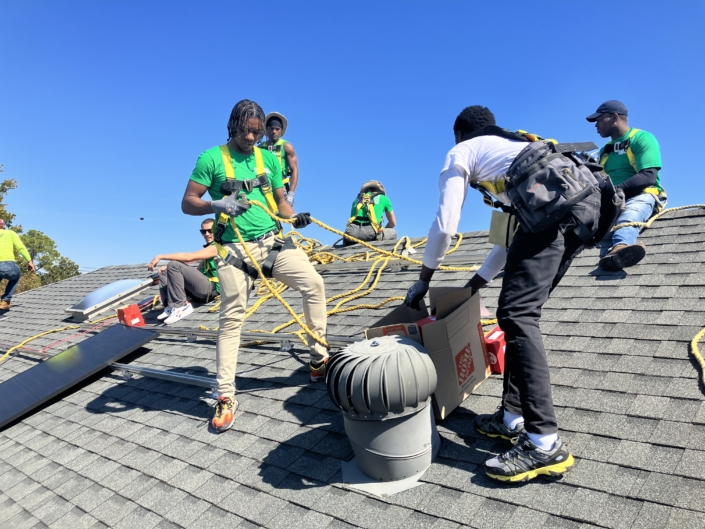
Northwest Youth Corps
Sound To Summit (S2S)
Washington
AmeriCorps – Education Award Program, Federal Cooperative Agreement (National Park Service, U.S. Fish and Wildlife Service)
Northwest Youth Corps’ Sound to Summit (S2S) program engages teens from urban communities in the South Puget Sound area, offering them opportunities for local learning and service. Focused on tree care, trail maintenance, and invasive species removal, the program spans from Puget Sound to Mount Rainier and has been operating since 2017. This year, 54 teens participated in conservation service activities, including tree watering, staking, trail maintenance, and removal of invasive English Ivy and blackberry, while earning stipends and high school credits. Corpsmembers with the Tacoma Crew at Mt. Rainier National Park and the Lacey/Olympia Crew at Olympic National Park removed one acre of Herb Robert and planted 475 young plants on Deadhorse, supporting Mt. Rainier’s initiative to plant 35,000 plants in the area by the end of the year. Their efforts extended to Olympic National Park’s Matt Albright Native Plant Center, where they harvested around 1,000 native seeds, transplanted 333 wandering fleabane plants, cleaned 1,160 pots, removed one acre of Herb Robert near Port Angeles Visitor Center, cleared thistle from a one-acre field, removed one acre of Oregon Sunshine, and transplanted 244 Canada goldenrod plants.
By expanding its reach through partnerships with agencies and funders, such as the National Park Foundation and The Russell Family Foundation, S2S enhances diversity in conservation efforts. This innovative project combines urban and backcountry programming, a model that promotes diversity in workforce initiatives by national agencies. The S2S program not only advances environmental justice but also instills a sense of conservation citizenship in participants, fostering pride in public lands and contributing to the Corps movement’s overarching goals.
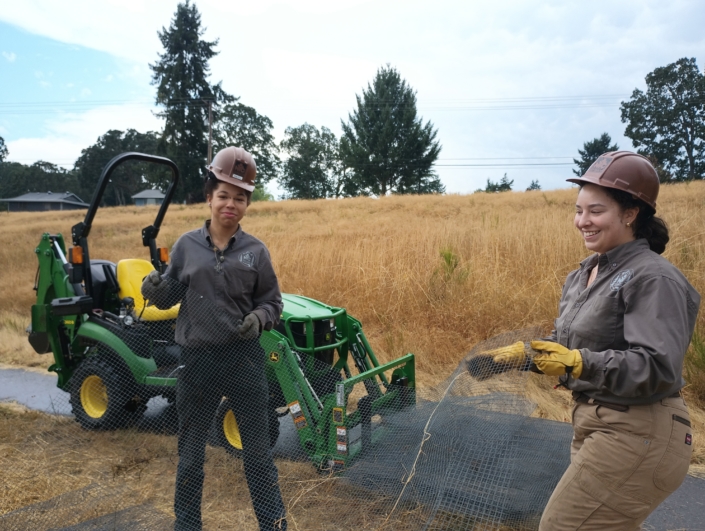
Student Conservation Association
Wrangell Island Trail Crew
Alaska
AmeriCorps – Education Award Program
Over the summer, 2023, Student Conservation Association sent an Alaska Trail Corps Team to Wrangell Island. Wrangell island is a small island in Alaska with a population of around 2000 people and is only accessible by boat or by plane. The four-person crew quickly formed close bonds as they worked daily with each other and with locals on the island. Throughout their term the team stayed in a small USFS float house and completed projects in Wrangell Ranger District of Tongass National Forest and in the city of Wrangell. The small crew made a big impact on the island doing everything from cabin and trail maintenance to cleaning of sites and pathways along the road system.
The Wrangell Island Trail Crew had the opportunity to work closely with the local community. SCA believes that the ability to work closely with the community helps Corpsmembers feel good about the work they are doing and the people they help, while community members are more appreciative of their work. In addition to skills like wilderness first-aid and chainsaw training, Corpsmembers had the unique opportunity to spend time with the local Tlingit tribe and were able to participate in cultural events. The crew also had the opportunity to build a 300-foot extension trail which will hopefully be used to connect the trail to a network of trails that span the island.
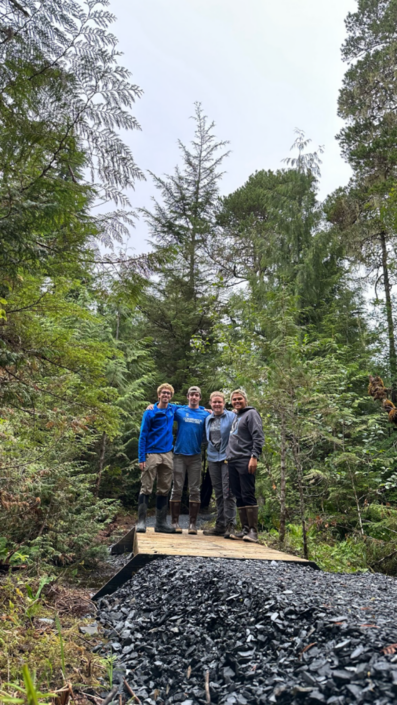
Trenton Climate Corps
The Sensory Garden
New Jersey
Delaware River Climate Corps
Trenton Climate Corps’, Sensory Garden, is a Corpsmember designed project that used funding from the 2023 New Jersey Martin Luther King Jr. I Have a Dream grant. The project turned an old gravel lot into a beautiful community space. The garden is meant to appeal to all the senses. There are edible plants and herbs to taste, a variety of native and fragrant plants to smell, and natural as well as man-made features to hear and touch.
The Sensory Garden serves a greater community purpose than just beautification of space. It also serves as a space for community engagement. Community members have the opportunity to learn urban agricultural techniques and apply their new skills to their own plots. They can also use the Zen garden as a sensory experience and a method of relaxation. The garden is also serving the purpose of reintroducing native plants to Trenton’s ecosystem allowing for local ecological regeneration by attracting native pollinators. Ten Corpsmembers were able to participate in turning the lot into a park. They learned how to construct garden beds, select and plant appropriate plants and engage the community. Trenton Climate Corps’ believe that giving Corpsmembers the opportunity to design their own projects allows for them to be creative and develop leadership skills.
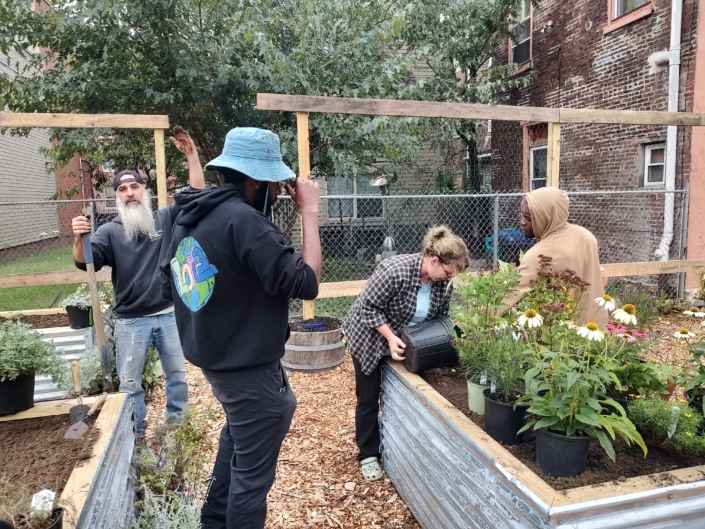
Urban Corps of San Diego County
Increasing Visitor Access and Decreasing Invasive Plant Access to Tidepools via the Future Trail
California
Urban Corps of San Diego County (Urban Corps) worked with Cabrillo National Monument to increase visitor access to the park’s trail system. They did this by creating a new trail to connect the coastal area to the upper monument. The project removed invasive plants and cut 2,090 linear feet of trail for the future trail. The project allows for access that was previously unsafe for pedestrians due to a road separating the two areas and represents new opportunities for Urban Corps and their Corpsmembers. All the project partners including National Park Service and National Park Foundation were new to Urban Corps and opened up new opportunities to work alongside NPS staff for Corpsmembers.
Working with Cabrillo National Monument allowed Corpsmembers to learn more about the National Park Service and the role that the monument plays in the community. In exchange, the project supports the park’s goals of connectivity and public accessibility and bringing more visitors to enjoy the natural resource. The park estimated that the project will support 2,000 new visitors in the next two years and increase the public’s access to outdoor recreation. Overall, Urban Corps is excited to be able to expand its partnerships and the opportunities that it can provide for its Corpsmembers.
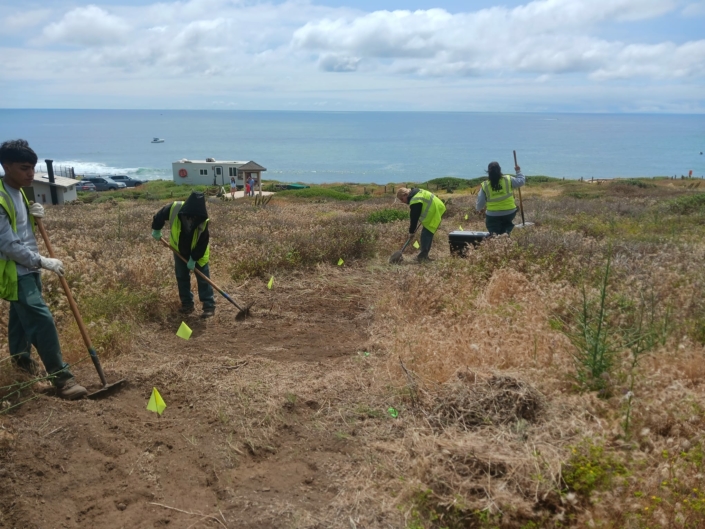
Utah Conservation Corps
Bia Ogwa
Utah
AmeriCorps – Education Award Program
In collaboration with the Northwestern Band of the Shoshone Nation, the Utah Conservation Corps (UCC) has been conducting long-term restoration projects along Bia Ogwa, a National Historic Landmark. Also known as the Bear River, this location witnessed one the worst indigenous massacres in US history in 1863. Over the past 160 years, the riparian habitat along the Bear River, and the river itself, have become severely degraded due to invasive species. The Bia Ogwa project aims to increase climate resiliency and restore the natural habitat to the state as when inhabited by the Shoshone Tribe, prior to the pioneer farming practices that led to a loss of precious wildlife and native habitat resources.
This collaboration marks UCC’s first Tribal partnership, emphasizing environmental justice and climate resilience. The project began in the fall of 2021, when UCC AmeriCorps crews treated 11.62 acres along 1.652 river miles that included removal of 1,613 invasive Russian olive trees. UCC crews also repaired fencing on the site and prepared biochar kilns to prepare soils for propagating native vegetation around the site. UCC crews returned next fall and treated 9.14 acres, removed 444 invasive Russian olive trees, and constructed .14 miles of new fence. Northwestern Band of the Shoshone Nation Vice Chairman Brad Parry commented that, “We are grateful that the UCC has agreed to work with us on this very special project. This is the first step in creating the spiritual feeling we want to create at the site.” This project strengthened UCC by broadening perspectives, fostering community bonds, and instilling cultural and historical dimensions in conservation work. Aligning with Corps movement goals, this project combines habitat and cultural restoration, contributing to equity, inclusion, and justice in conservation efforts.
